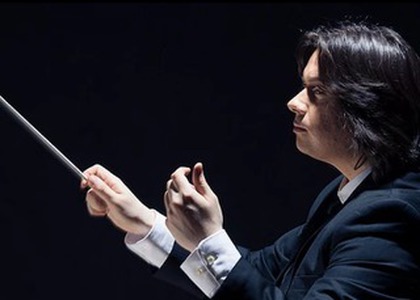> [Archived] Interviews

Interview with conductor Gabriel Bebeselea about the concert held with the actress Isabel Karajan
Mr. Gabriel Bebeselea, on Thursday - April 7th and Friday - April 8th, the Symphony Orchestra of the "George Enescu" Philharmonic will be led by you. Before we get into the details about the concert, we know that you are the principal conductor of the orchestra, how has the collaboration with the Philharmonic evolved since you were in this position?
Every time I am glad to come back with my colleagues from the "George Enescu" Philharmonic because, every time, it is an interesting sound journey. And, every time I come back, we discover new ways to search and find interesting sonorities and to find auditory hypostases that I think the auditor will enjoy when he enters the hall of the Romanian Athenaeum.
We know that one of your concerns and worries lies in the fact that, in Romania, the repertoires - for the most part - have remained at a paradigm of the half of the XXth century, avoiding to familiarize both the orchestra and the public with works from today. Behold, in the upcoming concerts at the Philharmonic will be presented in the first absolute audition Cold poems for actor and orchestra by Dan Dediu. How would you talk to us, understandably, about the music of Dan Dediu?
Dan Dediu's music, in general, is a music of extraordinary depth and efficiency rarely seen. When Dan Dediu aims to convey something to the public, inevitably that feeling, that state is transmitted. It is also the way in which I would very briefly describe this new work of his, which will be in the first absolute audition, which has in the center of the stage Isabel Karajan, an Austrian actress, the daughter of the famous conductor Herbert von Karajan, who is for the first time in Bucharest and, even more so, is in a hypostasis of being part of an orchestra. Cold poems is based on the texts of Ernst Jandl, an Austrian deconstructivist poet, who was part of the Austrian avant-garde and practically revolutionized the German language from a certain perspective; because he decomposed the words and ordered them in a completely different way and changed and metamorphosed them in such a way that the Austrian language was much richer after his creation. I would dwell on a poem that I admit will be extremely intense, on Thursday and Friday, because, although the play was composed by Dan Dediu some time ago, part three is a poem titled after a contraction of the consonants from a word in German, in Romanian meaning trenches. It is a phonetic description of the constituent consonants of this word, of the sound of war. Although I'm sure no one knew what would await us now better than a month and a half, the song being composed long, long before, unfortunately it perfectly describes the current situation and what is happening at the border of Romania, not very far from us. So I think this piece is going to be intensely experienced by the listening audience because it's exactly the noises described from the perspective of a person who's in the trenches.
And an absolute surprise will be that the song is composed in such a way that it will be directly linked, without pause, to the Piano Concerto No. 3 by Prokofiev. It's an experimental situation, but in fact, the underlying idea is that after such poems it's very hard to applaud. And then, the very interiorizing and very philosophical beginning of Prokofiev's Piano Concerto No.3 will start ex abrupto from Dan Dediu's piece, the conception being from the beginning in such a way as to allow us to do so.
In concerts that propose absolute first auditions, they risk eclipsed the other opposites in the program. In our case, we are talking about Concerto no. 3 for piano and orchestra by Sergei Prokofiev, with Daniel Ciobanu - soloist and Symphony No.6 Pastoral by Ludwig van Beethoven. What do you think are the strengths of this half-program?
Daniel Ciobanu is one of the most remarkable pianists, not only Romanians; he is one of the most interesting and ecstatic, I might say, musicians at the moment, not just from the younger generation. And it is precisely this type of philosophical experiment that also suits his personality which, will be a surprise, but will inevitably be part of Dan Dediu's play. And, as I said, it will be the engine that will lead to the Concerto No. 3 by Prokofiev, which Daniel Ciobanu sings absolutely masterfully and is one of his quintessential works.
Why did I choose Beethoven's Pastoral Symphony? It would seem like a counterweight to the pain of Jandl's Cold Poems and Prokofiev's music, but in fact they are philosophical elements that are found in everything - and in the poems of Jandl, and in the music of Prokofiev - namely, nature, divinity, the roughness of life symbolized or metamorphosed in fact being personifications of the storm in Beethoven's Pastoral Symphony. And the end of Beethoven's symphony is called The Shepherd's Song, thanks to the deity that the storm is over and it's exactly what, in fact, Beethoven is trying to convey in a very metaphorical way in this symphony, but he's trying to convey in his last symphony, the ninth, through Schiler's text that says that all people will become brothers, embrace. Million. It is about the same thing; after the storm, the silence will follow. That's exactly what I hope will happen as soon as possible with this difficult time.
Photo credit: Ionuț Macri
Translated by Beatrice-Andreea Porumb,
University of Bucharest, Faculty of Foreign Languages and Literatures, MTTLC, year I
Corrected by Silvia Petrescu














